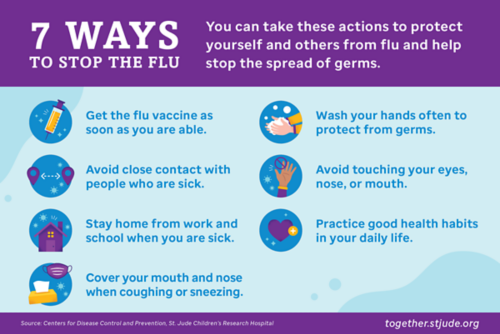Influenza, or flu, is a common respiratory illness caused by a virus. Flu is an infection of the lungs, nose, and throat. Flu symptoms can range from mild to severe. In some cases, flu can be life-threatening.
Flu spreads easily person to person:
- Through droplets in the air when someone coughs or sneezes
- By touching surfaces with the virus
You may be able to spread the flu virus before you even know you are sick. You may be contagious for 7 days or longer after becoming sick.
The best way to prevent the flu is to get a yearly flu vaccine.
Other ways to help stop the spread of flu include:
- Wash hands often
- Cover coughs and sneezes
- Stay away from people who are sick
- Wear a face mask
Find more information on flu vaccines
Flu symptoms include:
- Fever
- Chills
- Cough
- Sore throat
- Runny nose
- Body aches
- Headache
- Fatigue
In severe cases, the flu can cause breathing problems, pneumonia, or other life-threatening complications.
Some people are at higher risk for serious illness with the flu. These include:
- Children under age 5
- Adults over age 65
- Pregnant women
- People with chronic health conditions
- People with obesity
- People with weak immune systems
Close monitoring is important for people with weak immune systems. But even healthy children who get the flu can become quite sick. Talk to your health care provider about any symptoms that worry you.
A lab test can diagnose flu. This is usually done in a clinic or at a doctor’s visit. Your health care provider will swab the nose or the back of the throat to collect a sample. The sample is then tested to see if it is positive for the flu virus. The most common types of seasonal flu virus are influenza A and influenza B.
Your health care provider may prescribe an antiviral medicine to treat the flu. This medicine helps keep the flu virus from reproducing.
Flu antiviral medicines work best if you start taking them within 2 days of becoming sick. This can reduce the severity of symptoms and shorten the time that symptoms last.
Flu antiviral medicines are available in pill, liquid, inhaled powder, or intravenous (IV) forms. They are only available as a prescription from your health care provider. These medicines only work on the flu virus and should not be used to treat other types of infections.
Your health care provider may recommend over-the-counter (OTC) medicines to treat flu symptoms. Talk to your provider about what OTC meds are safe to use.
To help manage symptoms of the flu:
- Drink plenty of fluids
- Rest
- Treat symptoms using over-the-counter medicines as recommended by your health care provider
- Take flu antiviral medicines as prescribed
- Watch for worsening of symptoms or health problems such as ear infections
- Monitor for emergency warning signs such as dehydration, seizures, or breathing problems
Seek medical care if symptoms get worse or do not improve.
When to call your care team
Most people have mild or moderate flu symptoms. But some people can get very sick. Watch for emergency warning signs such as:
- Fever above 104°F (40°C)
- Trouble breathing
- Chest pain or pressure
- Severe muscle pain
- Confusion
- Becoming less alert
- Lips or face turning blue
- Seizures
- Dehydration (not peeing, lack of tears)
- Fever or cough that will not go away
- Chronic conditions that get worse
This list includes some common warning signs, but there may be others. In a medical emergency, go to the emergency room or call 911.
Questions to ask your care team about flu




